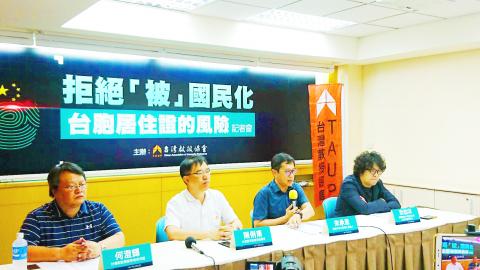The Taiwan Association of University Professors (TAUP) yesterday called for more government measures to counter Beijing’s move to offer residency permit cards to Taiwanese in China, which it said could have serious consequences for Taiwanese on a personal and national level.
The Chinese State Council Information Office on Aug. 16 announced that, starting tomorrow, Taiwanese, Hong Kongers and Macanese who have lived in China for more than six months and are legally working, living or studying in the country would be eligible to apply for a residence card.
Card holders would be granted certain rights and benefits enjoyed by Chinese citizens, such as compulsory education, social insurance and housing subsidies.

Photo: Chung Li-hua, Taipei Times
While the benefits might be attractive, the risks are unclear and the cards could have far-reaching consequences, Taiwan Association for Strategic Simulation (TASS) researcher Ho Cheng-hui (何澄輝) yesterday told a news conference in Taipei, adding that the policy is “another stick and carrot move designed to undermine Taiwan’s national status by treating it as a special administrative region.”
As examples of the risks involved, he said that residents who apply for their cards could be required to provide their fingerprints and other personal information to the Chinese government and subject themselves to Chinese tax laws.
Given Beijing’s attitude toward Taiwan, the two are unlikely to reach any tax agreements and Taiwanese residents in China could end up being taxed on both sides, he said.
Once the line between Taiwan and China begins to blur, Taiwanese could also become excluded from opportunities for technological exchanges and business cooperations with countries like the US, as more countries around the world are stepping up measures against Chinese economic espionage, he added.
Moreover, those who apply would be subject to China’s authoritarian laws banning free speech and other basic human rights, said Raymond Sung (宋承恩), a doctoral student at Oxford University.
“By applying for the permit, Taiwanese agree to Beijing’s political rule, which implies an obligation to help bring about unification and not support Taiwanese independence, and to obey Chinese laws restricting freedom of speech and other political rights,” he said.
The issue is further complicated by the uncertainty about the Taiwanese government’s role in legal disputes concerning the rights of Taiwanese residents in China, as it would be unclear whether they can still be considered Republic of China citizens, he added.
With the policy only days away from being implemented, the Taiwanese government must take action to reduce its effect, TAUP deputy secretary-general Chen Li-fu (陳俐甫) said.
As a countermeasure, he proposed redesignating Chinese residents in Taiwan as “Chinese,” rather than “mainland,” on official documents to enhance the distinction between Taiwanese and Chinese.
“That would not be to cut back official protection of their human rights, but to make it clearer that they are not citizens, as Beijing tries to blur that distinction,” he said.
Sung also said that household registrations of Taiwanese who apply for the permit should be canceled according to Article 9-1 of the Act Governing Relations between the People of the Taiwan Area and the Mainland Area (臺灣地區與大陸地區人民關係條例).
Removing a person’s household registration strips them of National Health Insurance coverage, but not their citizenship, he said, adding that people could reapply for a household registration.

An essay competition jointly organized by a local writing society and a publisher affiliated with the Chinese Communist Party (CCP) might have contravened the Act Governing Relations Between the People of the Taiwan Area and the Mainland Area (臺灣地區與大陸地區人民關係條例), the Mainland Affairs Council (MAC) said on Thursday. “In this case, the partner organization is clearly an agency under the CCP’s Fujian Provincial Committee,” MAC Deputy Minister and spokesperson Liang Wen-chieh (梁文傑) said at a news briefing in Taipei. “It also involves bringing Taiwanese students to China with all-expenses-paid arrangements to attend award ceremonies and camps,” Liang said. Those two “characteristics” are typically sufficient

A magnitude 5.9 earthquake that struck about 33km off the coast of Hualien City was the "main shock" in a series of quakes in the area, with aftershocks expected over the next three days, the Central Weather Administration (CWA) said yesterday. Prior to the magnitude 5.9 quake shaking most of Taiwan at 6:53pm yesterday, six other earthquakes stronger than a magnitude of 4, starting with a magnitude 5.5 quake at 6:09pm, occurred in the area. CWA Seismological Center Director Wu Chien-fu (吳健富) confirmed that the quakes were all part of the same series and that the magnitude 5.5 temblor was

The brilliant blue waters, thick foliage and bucolic atmosphere on this seemingly idyllic archipelago deep in the Pacific Ocean belie the key role it now plays in a titanic geopolitical struggle. Palau is again on the front line as China, and the US and its allies prepare their forces in an intensifying contest for control over the Asia-Pacific region. The democratic nation of just 17,000 people hosts US-controlled airstrips and soon-to-be-completed radar installations that the US military describes as “critical” to monitoring vast swathes of water and airspace. It is also a key piece of the second island chain, a string of

The Central Weather Administration has issued a heat alert for southeastern Taiwan, warning of temperatures as high as 36°C today, while alerting some coastal areas of strong winds later in the day. Kaohsiung’s Neimen District (內門) and Pingtung County’s Neipu Township (內埔) are under an orange heat alert, which warns of temperatures as high as 36°C for three consecutive days, the CWA said, citing southwest winds. The heat would also extend to Tainan’s Nansi (楠西) and Yujing (玉井) districts, as well as Pingtung’s Gaoshu (高樹), Yanpu (鹽埔) and Majia (瑪家) townships, it said, forecasting highs of up to 36°C in those areas